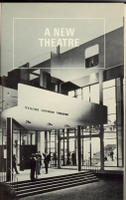
McGraw-Hill Book Company -- hc
New York -- ©1964 -- 188pp
Library of Congress Catalog Card Number: 64-22458
An exploration of the reasons behind Guthrie's building of a new theatre in Minneapolis, MN, and his reflections of the first season.
I am very impressed with Guthrie's thoughts and reflections on theatre in general.
"Great drama," he writes, "always adds... some philosophical comment or allegorical overtone, not necessarily -- or even frequently -- with a conscious didactic purpose, but always with didactic possibilities."
Twice he defines "drama," both accurate and succinct. "Drama is...the re-creation by actors of a group of persons and a series of events." And, "Drama is the telling of a story in the most vivid possible manner."
And here he seems to put his finger on what is precisely right...and wrong...with theatre today (the today of forty years ago and still the today of now):"The theatre exists to entertain. Entertainment can be educative; but it is a regrettable fallacy that a serious theatre must be consciously instructive. The fallacy has been fostered by theatre people, because we have learnt, by bitter experience, that public bodies will give you funds if they can be persuaded that you aim to Educate. But if, more truthfully, you admit that your first aim is to Entertain then you won't get a cent."
This certainly hasn't changed one iota. In fact, as the arts continue to struggle to survive, the "education factor" for each project seems more and more vital. When do we get to play?
Guthrie wraps up his book with this thought:"The three greatest periods in the history of the theatre -- the Athenian stage of Aeschylus, Sophocles and Euripides; the Elizabethan stage in England which produced Marlowe, Shakespeare, Ben Jonson and half a dozen lesser but significant poets; the French stage of Racine, Corneille and Moliere -- all these could not have happened if the writers, actors and craftsmen had not been fortunate enough to live in an age and place where a highly intelligent, lively and demanding audience had helped to create a theatre which was far more than a commercial business and far more than a frivolous pastime. Neither the artists and craftsmen nor the audience can do this alone. It is a shared process of creation, a fruitful union."
I'm not sure that this has been recognized or acknowledged any better than the way Guthrie puts it in this book. It is certainly food for thought for those of us who look to produce Art. We can only do so much without a cooperative audience.
1 comment:
I think this journal is a very worthwhile project, and count me impressed by the scope and breadth of your reading.
Post a Comment